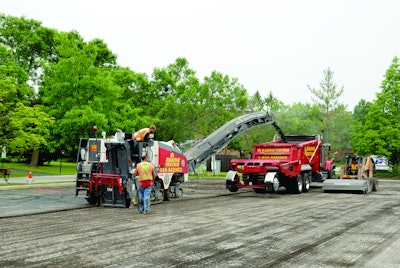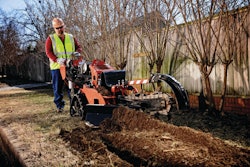
This is probably the first time you’ll read an article about a pavement maintenance contractor who projects to reach $1 billion in sales in 10 years. That’s right, billion. Rabine Group, an umbrella organization for nine companies – six directly related to paving and pavement maintenance – has set $1 billion as its 2021 target, and based on recent growth and plans already underway, CEO Gary Rabine says it’s a very reachable goal.
“But reaching the goal is not as important as shooting for it,” says Rabine, who started the company as a driveway paving business in 1981. “Over the years we’ve refined our approach to this industry and as our recent growth has demonstrated, we think we’re on to something.”
Hard to argue with that. A small company that was almost broke in 2002 – Rabine and his wife were forced to sell some property to keep it going – the company generated $30 million in sales in 2005 and $140 million in sales in 2010, exceeding its previously established 5-year goal by $80 million. But that’s getting a little ahead of the story.
“Undoubtedly we are a nice-sized organization and have high level growth expectations, but many of the things that have enabled us to grow are initiatives that contractors of just about any size can take on,” Rabine says.
From internal restructuring to external efforts to target the appropriate customers and extend its reach, Rabine Group, Schaumburg, IL, has learned how to make an impact in its Northern Illinois market – and beyond.
Starting in 1981 at the age of 18 using an old drag-box paver and one-ton roller, Gary Rabine was up and running. Within two years, Rabine was completing upwards of seven driveways per day with help from his father, Gary Sr., and some neighborhood friends as his labor force. Sealcoating was subcontracted out at the time. That was the genesis of Rabine Residential, one of six pavement maintenance-related businesses beneath the Rabine Group umbrella. Soon to follow were Rabine Paving (commercial paving), Pavement Solutions (pavement maintenance), UltraLot (full-depth, pervious, and concrete white-topping), Rabine Paving America (national accounts), SnowPros by Rabine, and three companies that dovetail nicely with the pavement maintenance focus: Roofing Solutions, Palatine Oil Company (fuel delivery), and Pipe View (underground pipe evaluation).
But Rabine Residential started it all. Shortly after Rabine brought sealcoating in house he decided he needed a self-propelled paver if he was going to grow. Unable to afford it on his own he partnered with his father to buy a Leeboy 700. In the early 1990’s Rabine Paving was generating $2 million in sales annually, but because he and his father didn’t see eye to eye on company direction and growth, Rabine bought his father’s share of the company after the 1993 paving season.
“And that’s when I really started to learn some lessons,” Rabine says. “I had to grow fast and grow a lot to be able to buy him out and I had no room for error. I learned how to bid to realize a profit, I learned how to produce to realize a profit, and I learned how to job cost to realize a profit on every job. I learned lessons well worth what it cost me to buy my Dad out because today we know our profit every day and on every job.”
In 1996 the company built a 600 ton-per-hour hot mix asphalt plant “because I thought that was the direction I wanted the company to go. Road paving is where everyone wants to go, you know,” Rabine says, but he soon learned that the size of the plant was too large for the market and sold it to a competing HMA producer.
Eventually he bought a smaller HMA plant in Byron, IL, and a second plant in Belvidere, and today the Rabine Group’s six pavement-related companies generate 90% of sales from parking lot maintenance and reconstruction with the remaining 10% coming from new construction and snow removal. Rabine Group employs 340 people among all companies including a centralized operations hub that handles accounting, sales, marketing, payroll, and other general administrative functions for all the companies under the Group umbrella in addition to the operating labor crews for paving, roofing, and fuel distribution.
Discovering the Advantage of Differentiation
Rabine says that in the early 1990s the company started to understand that being different and offering something different to customers would help set the company apart from its competition. He says their first Ray-tech infrared machine, the introduction of stamped asphalt, hiring its first pavement engineer in 1995, and expanding its service offerings all were early efforts at differentiation.
“That gave me the ability to get in front of the customer with a solution none of my competitors had,” Rabine says.
And Rabine developed its slogan, “Discover the Difference,” to highlight its differences. “It forces the customer to ask the question ‘What IS the difference?’ and gives us the opportunity to tell them. We have more options for customers than they may be aware of,” Rabine says. “With our company a customer can get concrete or asphalt. We can give them the life cycles and costs of both and we don’t care which way they go because we can provide both. That means we can provide the best match for solution to their budget.”
Creating Separate Companies
The decision to divide the company up into separate, individually focused service companies came partly as a result of Rabine’s realization that he needed to differentiate. Rabine Paving became the commercial paving business, Rabine Residential had a driveway focus, and Pavement Solutions was the contractor’s pavement maintenance arm.
“As we were growing and getting more involved with different types of customers I started to realize the industries were different and that we would benefit from industry specific leadership in each business ,” he says. “I don’t believe, for example, that residential paving expertise and leadership is the same thing as commercial paving expertise and leadership.” Each leader of a Rabine Group company must be passionate about the market they serve and strive to be the industry expert in that market.
With three companies Rabine needed people to lead each one, so while he ran Rabine Paving he hired Mike Pett to lead Rabine Residential and John Butler to lead Pavement Solutions. In addition Rabine hired Mike Johnson to improve and solidify the contractor’s operations and Johnson is now Rabine Group president. “He’s built a great group that handles operations, establishing great processes and systems for all Rabine Group companies.
“We worked hard to find the right people and the agreement was that as long as they remained passionate about the business and as long as they were the best at what they did, they’d have a chance to grow and succeed with us,” Rabine says.
Perhaps the biggest advantage Rabine gained from creating smaller, separate companies concerned accountability of each company.
“By separating the companies it forced each one to be profitable on its own and improve in its own niche,” Rabine says. “Losses can get buried when all segments are under the same umbrella but separating the companies gave us the mindset that each company had to be the best in its sector and be profitable in its sector.”
Weed and Feed to create a Sustainable and Profitable Business
Around the same time Rabine split itself into various companies another major change occurred that Rabine eventually used to redefine his business: In 2002 Rabine’s paving business became a union operation. Prior to 2002 the contractor had been a non-union shop catering to clients who didn’t want to deal with unions and who wanted only low-bid contractors. But when Rabine became a union shop they could no longer compete for those types of clients.
“We had to evaluate the business to adjust for the higher cost of doing business, and we decided to focus on Rockford and Chicago areas that were accustomed to working with union labor,” Rabine says. So the contractor bought an HMA plant in Belvidere (near Rockford), limited business with customers demanding non-union labor, limited working for customers that demanded lowest-bid contracts, and started focusing on bigger properties.
“We recognized that some customers, mainly developers and general contractors, weren’t loyal customers. I made less profit working for them but they were the first to turn their backs on me,” Rabine says. “I started to realize who the customers were that cared about our business. There are a lot of clients and vendors out there looking for win-lose scenarios – and we aren’t interested in doing business with those types of customers or those types of vendors. So we examined the customers we valued and worked to figure out how we could duplicate that.
“You have to understand how to identify the bad customers and the good ones and how to market to them,” Rabine says. “You weed out the bad ones and take care of the good ones. We call it ‘weed and feed’ and we do it on an annual basis.”
Those good customers ended up being large corporations and facilities owners and managers. “Basically anyone who had a large maintenance budget they had to manage,” he says. “We’re strategically selecting the customers and clients we’re going after,” he says. And that doesn’t mean Rabine only pursues big jobs. The contractor does between 10,000-12,000 jobs a year worth less than $2000 each for property owners and utility companies.
Deciding which customers to pursue lead Rabine to grow its market, first regionally and eventually nationally. Regional growth began under Rabine Paving as early as 1993 when the Northern Illinois contractor started doing work in the area of Chicago’s O’Hare Airport and also near Rockford in the northwestern part of the state. It didn’t take long for Rabine to realize the potential for expansion throughout the region.
“Some customers had properties throughout northern Illinois and they used three or four different paving companies to get their work done,” he says. “I knew we could differentiate ourselves by making their life easier by consolidating to use only one paving company.”
So starting in the mid-1990s Rabine Paving began adding locations, eventually reaching six in Illinois. “Additional locations enabled us to use local labor, which cut down on travel costs, and improved our responsiveness to clients,” he says. “Our clients want someone who can respond quickly and that’s difficult to do if you’re hours away.”
“Differentiation, customer service, and quality work are all great but if you can’t solve their problems, it’s all a bunch of hot air,” Rabine says.
Solving Customer’s Problems
“Our business is relationship-driven,” Rabine says. “If the trust isn’t there we don’t deserve their business; if we aren’t solving their problems we don’t deserve their business – that’s how we look at it.”
Rabine says the bottom line on the reason the company has grown is “consistently a result of trying to solve problems for our customers. As the customer grows those problems change, and we work on that so we can help them solve their new problems. And they grow in different regions, and as long as they are happy with us we hope they want us to help solve their problems on a national basis.”
The question Rabine faced as it worked to broaden its reach nationally was the same question other contractors face who seek to become national providers: How do they get consistency across the country? How does Rabine guarantee the service and quality they provide in Chicago to their clients in California? In some instances the company relies on floating Rabine crews that travel nationwide providing specialized services that local contractors can’t perform. But in most cases Rabine wants local contractors handling local work.
“Self-performing locations can do whatever the client needs and because they are local they can be very responsive,” he says. “We decided we need feet on the ground in those markets, personalized service.”
So in 2007 the contractor started Rabine Paving America (RPA) to focus on national clients.
“We saw we were losing work in some markets and that the work was going to contractors with national relationships,” he says. “We were losing the work just because we didn’t have the opportunity to get the work. So we started Rabine Paving America and a corresponding marketing blitz which gave us the opportunity to do work for customers nationwide.”
One of the first steps of the marketing campaign for RPA was to aim at national associations that housed companies in our target market – and the result was $400,000 in sales outside of Illinois the first year. Rabine self-performed one-third of the work and two-thirds was performed by between 10 and 15 pre-qualified partners, what the contractor today terms Certified Rabine Partners. He says today Rabine Paving America has more than 500 CRPs to select from throughout the country.
To assure greater control over those types of jobs Rabine has a dozen project managers who fly throughout the country to supervise projects. He estimates that by year’s end Rabine will need another dozen or so project managers, some of whom will be based in cities other than Chicago.
“We come in with a project manager and the project manager handles all the details and the work with the customer.” Rabine says. “The local contractor provides the crew and the foreman but we will handle all the logistics on the job.”
Plans for Huge Growth
The next step in national outreach is an acquisition program the company has begun this year that takes the concept of self-performing locations a step further, and it’s a major component of their effort to be a $1 billion company. In addition to relying on a stable of CRPs to satisfy customers, Rabine Group is targeting 15 population-dense markets throughout the country and intends to buy successful local contractors at the rate of three a year.
To assist in the acquisitions Rabine brought in Mark Herbick, president of Herbick Advisory Group, Buffalo Grove, IL. Together Rabine and Herbick developed a profile of the ideal contractor they’d like to acquire, and a major component of the profile is an owner who wants to stick around after the acquisition.
“The market culture is different in Chicago, Atlanta, Denver, Philadelphia – wherever you aim. The original owner and their team are in touch with the local culture” Herbick says. “In every market we want a culturally strong company that has built a reputation of trust, quality, and integrity. Our goal is to find the best of both worlds: the hands-on local, trust driven relationship in combination with the support of a world class organization that can provide national exposure and cutting edge products and services. We want to be the local preferred company but do business with the strength of a national entity.”
He says any company acquired will become a Rabine Group company, but will often retain the original name. The acquired contractor will become a standardized company, doing things “the Rabine Way,” and Rabine will own a majority interest while the prior owner will own some part as well.
“We are looking for owners that wish to take 70-90% of their chips off the table but still want to stay on board to help grow the new business rapidly, along with their stock value, while providing new and innovative solutions for clients in their target markets.”
“The single largest reason for our growth and success to this point has been the passionate leadership in each Rabine Group company. We look for that trend to continue with each new partnership, locating owners who have a passion for what they do that can be highly successful with the support and guidance from operations, marketing, sales, and engineering from our world class industry experts.”
“A lot of players in the market kind of hit a ceiling -- their business grows only to the point where they can personally handle it. If they’re the right fit and we acquire them we enable them to take what they’ve developed and go forward as part of Rabine Group, capture much more market share, and become much more successful in a short period of time. We feel confident that each company we merge with will see 30-50% growth per year over a 5 year span post-merger.”
















